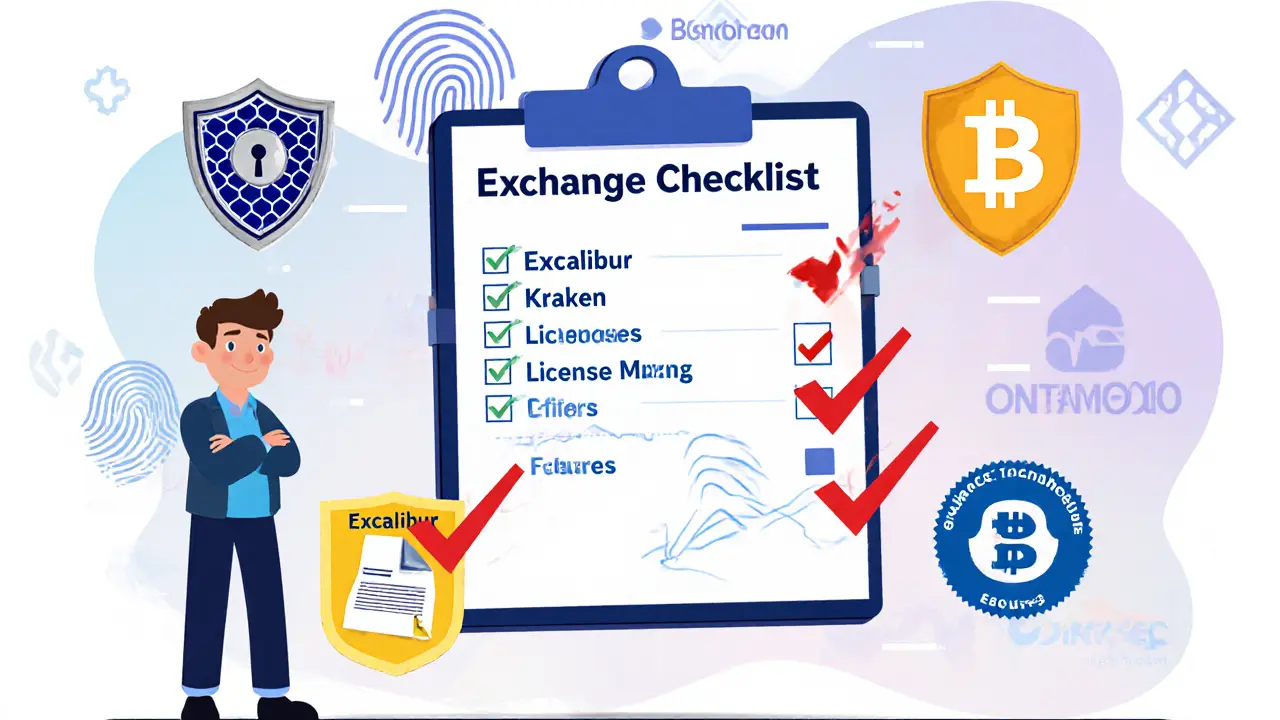Exchange Safety Checker
Check Your Exchange's Security
Use this tool to evaluate any cryptocurrency exchange against industry security standards. The tool checks the critical features from the Excalibur review article.
Security Assessment
Critical Missing Items
Comparison to Industry Standards
| Feature | Excalibur | Industry Standard |
|---|---|---|
| Cold Storage Percentage | 0% | 90%+ |
| Security Certifications | None | ISO/IEC 27001, SOC 2 |
| KYC Requirements | Not Required | Required |
| Liquidity | Unknown | High (100K+ daily volume) |
When you type Excalibur crypto exchange review into a search box, you’re probably hoping to find a clear picture of fees, security, and user experience. The reality is a bit messier - there’s almost no public data on an actual trading platform called Excalibur. What does exist is a lot of hype around the Excalibur Crypto Exchange a purported cryptocurrency marketplace that some sources claim is linked to a quantum‑secured cold‑wallet product. In this article we’ll unpack what we know, point out the red flags, and give you a checklist to evaluate any exchange that claims cutting‑edge security.
Why the information gap matters
Most established exchanges - think Binance, Coinbase, or Kraken - publish transparent statistics: daily trading volume, fee schedules, licensing details, and third‑party audit reports. Those numbers let users compare risk and cost. With Excalibur, the only publicly visible reference is a bare‑bones CoinGecko page that lists a “Trust Score” but provides no actual numbers. Without verifiable data, you can’t gauge liquidity, slippage, or even whether the platform is still operating.
What the brand actually sells
The name “Excalibur” shows up most often in connection with a quantum‑secured cold‑wallet. According to Krown Technologies the hardware company behind the wallet, the device uses Quantum eMotion’s QRNG (Quantum Random Number Generator) to generate keys that are theoretically immune to future quantum attacks. CEO James Stephens has said the wallet represents “a fundamental shift in how crypto wallets are secured.” The wallet, not a trading platform, is the product that has actually been demonstrated in labs.
Key security concepts to expect from any reputable exchange
Even if Excalibur’s “quantum‑secure” claim is genuine, a secure wallet is only half the story. A trustworthy exchange should also implement:
- Cold storage of > 95% of user funds.
- Two‑factor authentication (preferably hardware‑based or FIDO2).
- Regular third‑party audits (ISO/IEC 27001, SOC 2, Proof of Reserves).
- Robust AML/KYC procedures to meet global regulatory standards.
- Withdrawal whitelists and IP restrictions.
If an exchange can’t prove any of these, treat it with extreme caution.
How Excalibur stacks up against the industry leaders
Below is a quick comparison between the big three (Kraken, Binance, Coinbase) and the information we can actually find on Excalibur. Gaps are highlighted in red.
| Exchange | Founded | Supported Coins | Typical Trading Fee | Security Highlights | KYC Required |
|---|---|---|---|---|---|
| Kraken | 2011 | 200+ | 0.16% taker / 0.00% maker | ISO/IEC 27001, SOC 2, Proof of Reserves, 98% cold storage | Yes |
| Binance | 2017 | 600+ | 0.10% taker / 0.00% maker | Cold storage, 2FA, regular security audits | Yes (tiered) |
| Coinbase | 2012 | 300+ | 0.50% taker / 0.00% maker | Insurance on hot wallets, SOC 2, 94% cold storage | Yes |
| Excalibur | - | - | - | Quantum‑secure cold wallet (claimed); no public audit data | - |
The red cells indicate missing or unverified information. If an exchange truly offers “quantum‑secured” trading, it should still publish the basics listed above.
Red flags specific to Excalibur
- No transparent fee schedule. Users can’t calculate expected costs before depositing.
- Absence of licensing information. Regulatory filings in the US, EU, or Asia are not publicly linked.
- No third‑party security audit reports. Claims about QRNG‑based keys sound impressive but are unverified.
- Limited community presence. Searches on Reddit, Trustpilot, and major crypto forums return virtually no user experiences.
- Unclear deposit/withdrawal methods. It’s not obvious whether fiat on‑ramps exist.

Checklist for evaluating a new exchange
Before you move any funds to a platform that’s largely a mystery, run through this list. Treat any missing item as a deal‑breaker unless you have direct confirmation from the team.
- Verify the legal entity and jurisdiction. Look for a registration number or license number.
- Read the full fee schedule - trading, withdrawal, and inactivity fees.
- Confirm that at least 90% of assets are kept in cold storage; request the percentage.
- Check for independent security audits (ISO/IEC 27001, SOC 2, etc.).
- Make sure KYC/AML procedures are clearly outlined and not optional.
- Assess liquidity: compare daily volume on CoinGecko, CoinMarketCap, or official API.
- Test customer support response time with a real query before depositing.
- Look for insurance coverage on hot wallets or a Proof of Reserves audit.
How to do deeper research on Excalibur
If you’re still curious about Excalibur after reading this, here’s a practical research plan:
- Visit the official website and locate an “About” page that lists the team, founders, and advisory board.
- Search the company name in the local financial regulator’s database (e.g., FCA, FINMA, MAS).
- Check the CoinGecko listing for Excalibur for any updates on trading volume or trust score.
- Look for press releases or media coverage from credible outlets (CoinDesk, The Block, etc.).
- Join crypto Discord or Telegram groups and ask if anyone has used the platform.
Document every answer. If the answers remain vague, walk away.
Bottom line
Excalibur’s name is currently attached to a promising quantum‑secure cold‑wallet concept, not a fully fledged exchange with public data. Until the platform publishes transparent fee tables, licensing details, audit reports, and real trading volume, treating it as a high‑risk experiment is the safest move. Stick with exchanges that meet the checklist above, and keep an eye on any official announcements from Krown Technologies or Quantum eMotion that might clarify whether a true Excalibur trading venue is in the works.
Is Excalibur a real crypto exchange?
Public information only confirms a quantum‑secure cold wallet product. No verifiable exchange data (fees, volume, licensing) is available, so it cannot be confirmed as a functioning exchange.

What security features should an exchange have?
Key features include ≥90% cold storage, hardware‑based 2FA, ISO/IEC 27001 or SOC 2 certification, regular third‑party audits, withdrawal whitelists, and, increasingly, quantum‑resistant key generation.
How can I verify an exchange’s licensing?
Search the exchange’s corporate name in the regulator’s register (e.g., FCA, FINMA, MAS) for a license number. Reputable sites often link to this information on their “Compliance” page.
What is a quantum‑secured cold wallet?
It uses a Quantum Random Number Generator to create truly random private keys, making them theoretically resistant to future quantum computer attacks. The technology is still emerging and has not yet become a standard for exchange hot‑wallet security.
Should I deposit funds into an unproven platform?
No. Unless the platform provides transparent licensing, audit reports, fee schedules, and verifiable trading volume, treat it as high risk and keep your assets on established, insured exchanges.

Andrew Smith
October 22, 2025 AT 02:38Skip the hype and verify the cold‑wallet claims before you deposit.
Scott McCalman
October 22, 2025 AT 22:05Reality check 🚨: Quantum‑secure sounds slick, but no audit means you’re buying a mystery box. 🤷♂️
johnny garcia
October 23, 2025 AT 17:31In the absence of verifiable audit reports, prudent investors should treat the platform as unproven; 🧐 transparency is a prerequisite for trust.
Ryan Comers
October 24, 2025 AT 12:58All the buzz hides the fact that no jurisdiction has blessed this operation, so it’s safer to stick with exchanges that proudly display their regulatory badges.
Prerna Sahrawat
October 25, 2025 AT 08:25The allure of a brand named after a legendary sword is unmistakable in a market saturated with bland nomenclature.
The veneer of mystique cannot substitute for hard data such as on‑chain volume, fee schedules, or licensing disclosures.
When a purported exchange co‑opts a quantum‑secure cold‑wallet narrative, it is essential to dissect whether the technology is truly integrated into the custodial architecture or merely a marketing appendage.
The quantum random number generator, while academically impressive, does not immunize the exchange against operational risks like insider misconduct or software bugs.
Moreover, the absence of a publicly accessible Proof‑of‑Reserves audit raises immediate red flags for any capital‑conscious participant.
Regulatory compliance is another cornerstone; without a verifiable registration number in a recognized jurisdiction, the platform operates in a legal gray area.
Liquidity, the lifeblood of any exchange, remains an opaque metric here, as the CoinGecko listing lacks concrete daily volume figures.
Users should also scrutinize withdrawal mechanisms, ensuring that whitelists and IP restrictions are not merely buzzwords.
The modest community footprint-few threads on Reddit, scarce reviews on Trustpilot-suggests that adoption is either nascent or deliberately concealed.
In contrast, established exchanges publish comprehensive security whitepapers, undergo third‑party audits, and maintain insurance policies for hot‑wallet holdings.
The quantum‑secure proposition, while forward‑thinking, must be accompanied by the same rigor that conventional security practices demand.
Investors are advised to request explicit documentation of cold‑storage ratios, audit certificates, and the legal entity’s registration details.
If the team cannot furnish these artifacts, the prudent course is to refrain from allocating capital.
One might argue that early‑stage innovation often lacks polish, yet the stakes in crypto custodial services justify a higher evidentiary threshold.
Ultimately, the decision hinges on whether you are comfortable betting on a narrative rather than on substantiated operational excellence.
Joy Garcia
October 26, 2025 AT 02:51They’re probably shielding a hidden backdoor, and any silence on fees is a classic sign of a scam-stay alert.
Erik Shear
October 26, 2025 AT 22:18Cold storage is a must but without proof you’re just guessing the safety level
Tom Glynn
October 27, 2025 AT 17:45Great rundown! 👍 If you double‑check the licensing and audit links, you’ll keep your assets safe. 😊
Johanna Hegewald
October 28, 2025 AT 13:11Look for a clear fee table and a link to a security audit before you move any money.
Benjamin Debrick
October 29, 2025 AT 08:38Indeed, the lack of verifiable data-particularly concerning regulatory compliance, audit trails, and liquidity metrics-should raise immediate concerns; one must demand transparency before committing capital.
del allen
October 30, 2025 AT 04:05i think its susssy to trust a site wihout any real info, better safe then sorry.
Jon Miller
October 30, 2025 AT 23:31Thanks for the checklist, it makes the research process way less scary.
Lindsey Bird
October 31, 2025 AT 18:58Imagine pouring your savings into a phantom exchange-pure horror!
Stephen Rees
November 1, 2025 AT 14:25While the prose is luxuriant, the substance remains elusive; without empirical evidence the quantum claim is tantamount to alchemy.
Evan Holmes
November 2, 2025 AT 09:51Agreed, hype alone doesn’t pay the bills.
Isabelle Filion
November 3, 2025 AT 05:18One might appreciate the effort, yet the absence of formal documentation renders the platform academically intriguing but practically untenable.
PRIYA KUMARI
November 4, 2025 AT 00:45Such lofty rhetoric won’t protect users from losing funds; concrete proof is the only safeguard.